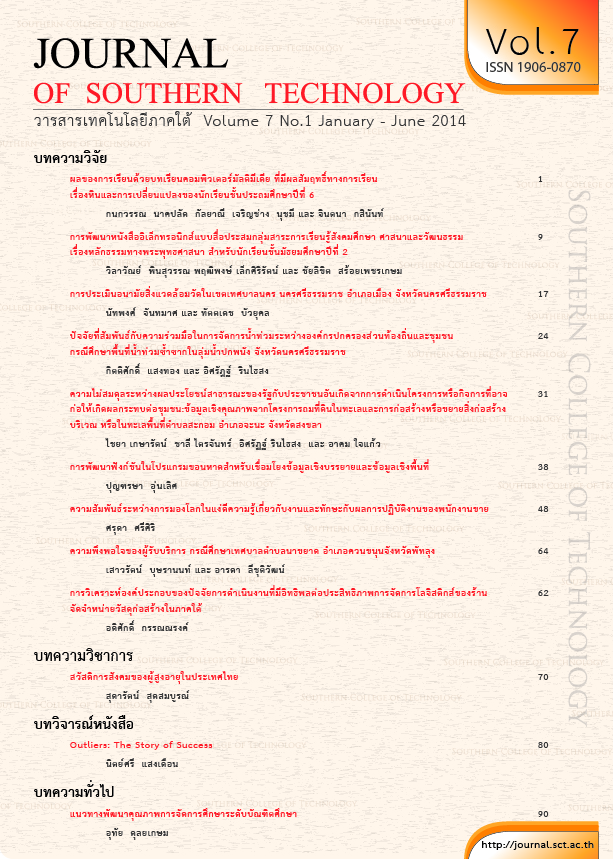การพัฒนาหนังสืออิเล็กทรอนิกส์แบบสื่อประสมกลุ่มสาระการเรียนรู้สังคมศึกษา ศาสนาและวัฒนธรรม เรื่อง หลักธรรมทางพระพุทธศาสนา สำหรับนักเรียนชั้นมัธยมศึกษาปีที่ 2
Main Article Content
Abstract
งานวิจัยครั้งนี้มีวัตถุประสงค์ 1) เพื่อพัฒนาหนังสืออิเล็กทรอนิกส์แบบสื่อประสม กลุ่มสาระการเรียนรู้สังคมศึกษา ศาสนาและวัฒนธรรม เรื่อง หลักธรรมทางพระพุทธศาสนา สำหรับนักเรียนชั้นมัธยมศึกษาปีที่ 2 ให้มีประสิทธิภาพตามเกณฑ์ 80/80 2) เพื่อหาดัชนีประสิทธิผลของหนังสืออิเล็กทรอนิกส์แบบสื่อประสม 3) เพื่อเปรียบเทียบผลสัมฤทธิ์ทางการเรียนของนักเรียนระหว่างกลุ่มที่เรียนด้วยหนังสืออิเล็กทรอนิกส์แบบสื่อประสมกับกลุ่มที่เรียนด้วยวิธีเรียนแบบปกติ และ 4) เพื่อศึกษาความพึงพอใจของนักเรียนที่มีต่อหนังสืออิเล็กทรอนิกส์แบบสื่อประสม กลุ่มตัวอย่างที่ใช้ในงานวิจัยครั้งนี้ คือ นักเรียนชั้นมัธยมศึกษาปีที่ 2 โรงเรียนหาดใหญ่วิทยาลัย 2 ภาคเรียนที่ 2 ปีการศึกษา 2555 จำนวน 102 คน โดยใช้วิธีการสุ่มกลุ่มตัวอย่าง แบบสุ่มกลุ่มและแบบแบ่งชั้นภูมิ เครื่องมือที่ใช้ในงานวิจัยได้แก่ 1) หนังสืออิเล็กทรอนิกส์แบบสื่อประสม 2) แบบทดสอบวัดผลสัมฤทธิ์ทางการเรียนที่มีค่าความเชื่อมั่นเท่ากับ 0.79 3) แบบสอบถามความพึงพอใจของนักเรียนที่มีต่อหนังสืออิเล็กทรอนิกส์แบบสื่อประสม 4) แบบประเมินหนังสืออิเล็กทรอนิกส์แบบสื่อประสม และ 5) แผนการจัดการเรียนรู้ กลุ่มสาระการเรียนรู้สังคมศึกษา ศาสนาและวัฒนธรรม เรื่อง หลักธรรมทางพระพุทธศาสนา สำหรับนักเรียนชั้นมัธยมศึกษาปีที่ 2 สถิติที่ใช้ในการวิเคราะห์ข้อมูล ได้แก่ ค่าร้อยละ ค่าเฉลี่ย ค่าเบี่ยงเบนมาตรฐานและการวิเคราะห์ความแปรปรวนหลายทางแบบวัดซ้ำ
ผลการวิจัยพบว่า 1) หนังสืออิเล็กทรอนิกส์แบบสื่อประสม มีประสิทธิภาพเท่ากับ 86.83/81.22 2) หนังสืออิเล็กทรอนิกส์แบบสื่อประสม มีค่าดัชนีประสิทธิผลเท่ากับ 0.57 3) ผลสัมฤทธิ์ทางการเรียนหลังเรียนของนักเรียนกลุ่มที่เรียนด้วยหนังสืออิเล็กทรอนิกส์แบบสื่อประสมสูงกว่านักเรียนกลุ่มที่เรียนด้วยวิธีเรียนแบบปกติ อย่างมีนัยสำคัญที่ระดับ .05 และ 4) ความพึงพอใจของผู้เรียนที่มีต่อหนังสืออิเล็กทรอนิกส์แบบสื่อประสม อยู่ในระดับมากที่สุด (4.55±0.61)
Development of Multimedia Electronic Book on the Topic of Buddhist Principles in Social Studies, Religion and Culture Subject for Grade 8 Students
The objectives of this research were 1) to develop the multimedia electronic book on the topic of Buddhist principles in social studies, religion and culture subject for grade 8 students to meet the standard criteria of 80/80, 2) to identify the effectiveness index of the developed multimedia electronic book, 3) to compare the academic achievement of the students who were taught with the developed electronic book and those with the conventional technique and 4) to study the satisfaction of the students with the developed multimedia electronic book. The sample for the study consisted of 102 grade 8 students attending Hatyaiwitthayalai 2 School during the second semester of the 2012 academic year. They were selected using stratified sampling technique. The instruments used in the study consisted of 1) multimedia electronic book, 2) an academic achievement test with the 0.79 reliability coefficient, 3) a questionnaire asking students’ satisfaction with the developed multimedia electronic book. 4) An evaluation form for multimedia electronic book and 5) a learning plan on the topic of Buddhist principles in the subject of social studies, religion and culture subject. The percentage, arithmetic mean, standard deviation and repeated measure factorial ANOVA were applied in the analysis. The findings of the study revealed the following. 1) The multimedia electronic book showed the effectiveness of 86.83/81.22. 2) The multimedia electronic book showed the effectiveness index of 0.57. 3) The achievement of the students who were taught with the multimedia electronic book was .05 significantly higher achievements than those taught with the conventional method at .05 level. And 4) the students showed a ‘very high’ level of satisfaction with the multimedia electronic book (4.55±0.61).
Article Details
-
Authors must agree to the journal publication rules and allow the editors to edit the manuscripts for publication.
-
Author’s right belongs to the author but Journal of Southern Technology holds the right of first publication and thus allow readers to use the article for the purpose of education but not commercial.

